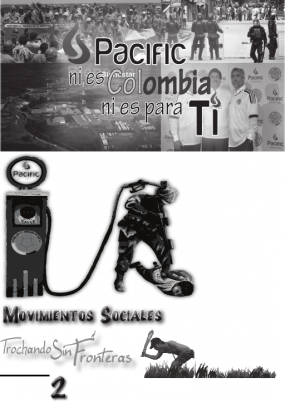In the Colombian reality different companies are using the term Corporate Social Responsibility (CSR) so as to appear committed to society, the environment and economic growth. In this dynamic it is wise to examine the definition these very companies and the government use: "A voluntary commitment taken on by organisations to fulfil expectations regarding material and comprehensive human development, generated with stakeholders and that, along with compliance with legal obligations, allows the organisations to ensure economic growth, social development and ecological equilibrium." (Colombian Technical Guide to Social Responsibility, ICONTEC (Colombia).
It should be understood that the organisations referred to here are the corporations. Working to this logic, Canadian multinational oil company Pacific Rubiales Energy has been giving economic support to the Summer Festival of Puerto Gaitan, the Pacific Rubiales Golf Tournament, and more recently has been sponsoring the Colombian national football team and a new football team in Villavicencio, Llanero Football Club.
However these 'voluntary' gestures by Pacific Rubiales can be dissected using cases that have been national news in Colombia. The first of these is the matter of the Indigenous Council El Turpial-La Victoria, a group of ethnic Achagua and Piapoco who sued Meta Petroleum Ltd, a wholly-owned subsidiary of Pacific Rubiales, for building a section of pipeline through their territory without the required prior consultation. This presence, according to the indigenous communities, has caused an increase in illness due to pollution of their waters, and has led to school absences and pregnancies among adolescents.
The second case was the period of protests by the workers at the Rubiales Oil Field in 2011 that paralysed production at the field for around a month, provoking confrontations with public security forces. In these protests the workers denounced their precarious conditions of work, labour outsourcing, a poor industrial safety regime and environmental pollution, among other problems.
The final case occurred in the border area between Casanare and Arauca, where the Social Organisations of East-Central Colombia, within the framework of a day of protest, blocked the Bicentario Pipeline (in which Pacific Rubiales has a 32.9% stake). The organisations demanded payment of the social debt of the oil companies, mitigation of environmental damage, and respect for indigenous rights as some of their most important demands.
The above facts demonstrate a clear contradiction between what the government and oil companies pretend should be happening and the discontent of the local communities – whose actions have dealt a blow to the company's reputation on a national and international level and caused a fall in its share price. No one wants to do business with people who subject their workers to poor labour conditions, violate the rights of indigenous people and don't take account of local communities because this always results in paralysis in production that immediately hits them in their ambitious pockets.
The company faces a problematic in which the use of violence to repress protests generates a drop in the price of their shares on the stock exchange (which is to say, it directly affects their profits). This is why they need other instruments to dissuade people from protesting and to protect their good image. At this point a new initiative enters the scene: Corporate Social Responsibility.
Three words that bring happiness to any company that has problems with workers, indigenous people, campesinos – that is to say with all working people: Corporate Social Responsibility. For Pacific Rubiales this involves a $20 million dollar strategy, as reported in their report on sustainability of 2011, of voluntarily carrying out projects "for the communities." However, since all this is voluntary, the company gets to decide which projects to approve and which not. Unfortunately they can take decisions unilaterally, and furthermore, they carry out their projects with parts of the community who sympathise with the politics of the company, which is to say they don't protest. But why do people insist on fighting and not accepting the money from Corporate Social Responsibility? This question can be answered with four compelling facts:
1. In 2011 Pacific Rubiales invested around $16 million in publicity, that is to say over 80% of the amount destined for Social Responsibility.
2. The salaries of the director-owners of Pacific, who apart from earning as shareholders, earn as directors of the company the small sum of $11.2 million every year, according to Money magazine It was reported that "Miguel de la Campa, José Fracisco Arata, Serafino Iacono y Ronald Pantin are in positions 14 to 17 respectively, among the 100 highest paid in Canada. Which is to say that on average the salaries (if we can call these salaries) for the four directors amount to two years of Social Responsibility.
3. The profits of Pacific Rubiales in 2011 reached $554 million (El Espectador, 2012), so the money for Corporate Social Responsibility represents just 3.6% of these profits.
4. The money used in Social Responsibility generates a reduction in the taxes paid by Pacific Rubiales.
Now the strategy of Pacific Rubiales is much clearer. They give a few crumbs of profit to the projects that they want, with who they want, for the communities that don't protest and will allow the looting of resources without making a fuss, and so they maintain their image at a high level, along with their share price. In the face of this situation the people of East-Central Colombia decided not to accept the crumbs of Corporate Social Responsibility and demand that their plans for living in their territories receive finance, which without a doubt would make a strong demand on the profits of multinationals, in this case Pacific Rubiales.
Published in Julio 2012 en Trochando sin fronteras
Translated by REDHER volunteer
